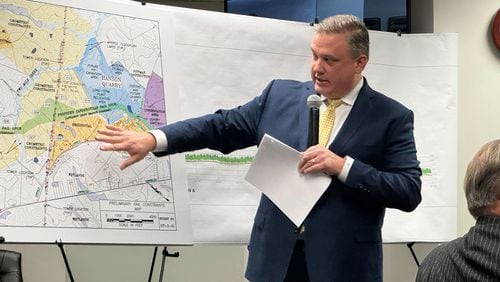A group of rural Georgia landowners is appealing a state board’s approval of a railroad’s plan to force the sale of their land to build a spur that will serve private businesses.
Earlier this month, the Georgia Public Service Commission voted unanimously to allow Sandersville Railroad to condemn portions of several parcels to build 4.5 miles of new tracks near Sparta, a town about 100 miles east of downtown Atlanta. The Institute for Justice, a nonprofit Libertarian legal group that represents several landowners facing the eminent domain claims, filed for appeal Tuesday in Fulton County Superior Court.
The case represents one of the most significant tests of Georgia’s eminent domain laws to emerge in years and could set precedent for use of the controversial power. The controversy has pitted a politically connected Georgia railroad against mostly Black property owners, some of whose families have ties to their land dating to slavery.
Eminent domain is when a government or utility forces a private property owner to sell some or all of their land for a project. The Fifth Amendment to the U.S. Constitution protects against abuse of eminent domain and requires “just compensation” for seized property. Georgia law requires a court’s determination that a project serves a “public use,” adding that economic development alone is not enough.
Sandersville Railroad President Ben Tarbutton III has said expansions to utilities’ grids and rail networks, such as his company’s proposal, meet the public use threshold. The company said it has agreements with the owners of nine of the 18 parcels it seeks to condemn, meaning the PSC’s ruling impacts the remaining nine parcels controlled by seven owners.
“The law is firmly on our side, as the spur serves a vital role in connecting Middle Georgia’s local industries to broader markets,” the company said in a statement Wednesday. “... This appeal is an attempt to prolong litigation and delay the benefits of the spur without valid cause.”
Institute for Justice senior attorney Bill Maurer called the railroad’s use of condemnation a “land grab” that only serves private interests.
“If a private company can take people’s land for the benefit of just a few private businesses, then nobody’s property is safe,” Maurer said in a press release.
Attorneys for Sandersville previously argued that the project, called the Hanson Spur, will create jobs and opportunity in Hancock County, one of Georgia’s poorest counties. The project would link a nearby rock quarry to an existing CSX Transportation line and might be used by other area businesses to ship goods, including grain, wood chips and liquid asphalt.
Sandersville Railroad said trains on the spur would travel less than 20 mph and only run during daytime hours on weekdays. The railroad also said the spur will boost tax revenues, pump $1.5 million annually into the area economy and create 12 new jobs with average salaries of $90,000.
As the state regulator for utilities — including railroads — the PSC had jurisdiction over the eminent domain case. Because of the appeal, the matter is now a civil case to be decided in Fulton Superior Court.







